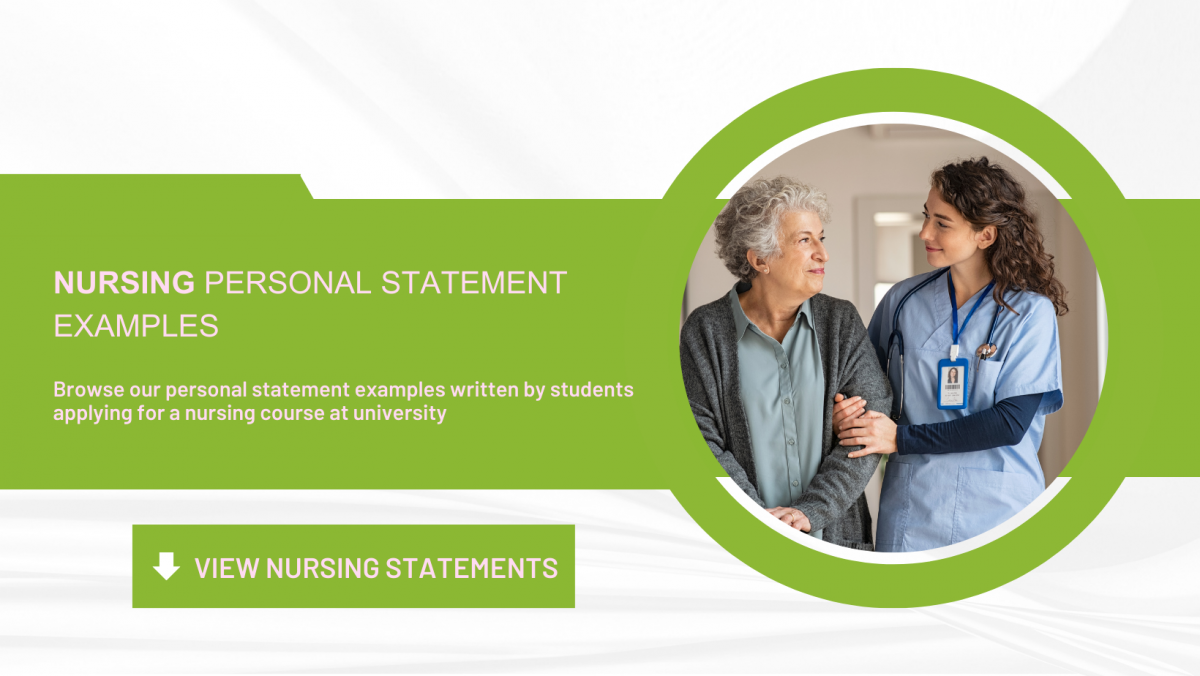

How to Write the Nursing School Personal Statement: Steps, Tips, And Samples

Introduction
A nursing career allows individuals to help patients in a nurturing environment, and to find their existential fulfillment. As a result, many learners decide to pursue a career in the field, and you are one of these individuals!
Eager to receive an acceptance letter? You know that you’ll need to submit the application material in a timely fashion, and part of that process involves crafting a stellar personal statement for nursing school.
According to a report by CNN , many applicants are rejected from nursing schools, unfortunately. Even when you feel that you have solid writing skills, you must hone these talents and gear them specifically toward that nursing school personal statement.
After all, you are looking to boost your chances of acceptance. Following a process and learning key pointers about this essay will help you to succeed.
Preparatory Work
Don’t simply sit down at the computer and start clicking away on the keyboard. Crafting a compelling personal statement for your target nursing school involves a significant amount of preparatory work. As seasoned writers know, the art of writing is a process.
Step 1: Research the Schools
Each school is going to have its unique requirements, and you want to know what those requirements are. Researching different programs serves multiple purposes. For example, you can start to rank the programs in order of your preference. Secondly, you get to determine what schools are reach schools and which institutions are your safety schools.
This process will also help you to get a sense of how competitive your personal statement should be. The best According to a ranking of 2023 Best Colleges for Nursing in America , the University of Pennsylvania, Emory University, and Duke University are listed as the top three.
If you’re applying to one of those institutions, you should go through your personal statement with a fine-tooth comb!
Step 2: Write Freely
At some point in your educational career, you’ve likely been asked to write freely about a topic. As you start seeing the prompts from different nursing programs, feel free to type your ideas, preferably, in a word-processing program on your computer.
You could challenge yourself to address one or more of the following prompts:
- What was your reason for choosing nursing as a career? Do you have any additional information that you would like the admissions committee to know about you that has not been previously considered in the application? (2000 characters)
- Discuss your interest and understanding of the clinical nurse leader role. What experiences have contributed to your interest? (2000 characters)
- The goal of the Doctor of Nursing Program is to prepare nurse leaders at the highest level of nursing practice to improve patient outcomes and translate research into practice. Describe experiences that exhibit your leadership skills. (2000 characters)
- Discuss the clinical specialty area you are interested in pursuing. What experiences have contributed to your interest? (2000 characters)
- Discuss a population of interest in your work setting. What experiences have you had with this population? What health care needs do you see in this target group? (2000 characters)
Check out more nursing school personal statement questions .
While the schools to which you are applying might not ask the exact questions, you have at least started to get your creativity flowing in terms of what you might write.
Step 3: Talk to an Admissions Counselor
As you’re narrowing down your choice of nursing schools, consider scheduling an appointment with an admissions counselor. Aim to schedule an on-campus appointment if possible as this gives you a real feel of the school environment. Where it is impossible to get one, as with the current Covid-19 pandemic, consider a virtual or telephone appointment.
An admissions counselor will provide you with guidance that is specific to their nursing school’s acceptable personal statement. In other words, different schools have varying expectations. While the admissions counselor may not answer all your questions, you still have a chance to receive valuable insight.
Step 4: Review Genre Conventions
Whether you applying at the undergraduate level or graduate level, you are already familiar with certain genre conventions. What you must recognize is that a personal statement can be quite different from other academic pieces that you have done. Penn State offers some great pointers on elements that characterize a personal statement .
For example, you might think that a personal statement needs to follow a five-paragraph format with a thesis statement as the last sentence of the introduction. While some personal statements take on this format, others employ a more reflective structure.
Step 5: Thoroughly Check Requirements
You want to make sure you know exactly how many nursing school personal statements you have to write for your application and what the requirements are for each one. Take an example from medical school. When students apply to medical school, they typically have to write one larger essay followed by several shorter ones.
Knowing the expectations of the specific programs to which you are applying can help you budget your time appropriately. Pay close attention to deadlines as well. Submitting an application after the posted deadline is a sure way to seriously lower your odds of getting admitted.
The Writing Process
Once you have completed the research phase and gathered preliminary information, you may think that you’re ready to craft the final version of your essay. However, writing is an intricate process. Allowing yourself adequate time to go through this process will heighten your chances of drafting a captivating essay.
Step 1: Print or Write down the Prompt
You must adhere to the prompt. Period. Keep in mind how crucial it is to follow protocols in the field of nursing. If you cannot follow the guidelines for a nursing school personal statement, the admissions committee may doubt your abilities in the field.
Printing out the prompt or jotting it down is quite useful because you can visually assess if you have checked off all of the requirements. Pay attention to how the prompt is worded. Further, note any length requirements; you may have to write at least a certain number of words or ensure that your essay does not exceed a specified number of characters.
When essays have character limits, make sure to find out if the character limit includes or excludes spaces. As you go through the writing process, you can check off each requirement on the prompt.
Step 2: Use a Brainstorming Strategy
I am confident you have great brainstorming techniques up your sleeves. If not, The Writing Center at the University of North Carolina at Chapel Hill offers some very handy brainstorming techniques that you could use.
Try to resist the urge to skip right ahead to the full first draft. Brainstorming allows you to get your ideas out. For example, you might look at the prompt and make a list of whatever ideas comes to your mind. You don’t need to worry about organizing them or fully developing the content yet. You could also craft a formal outline as you brainstorm ideas. See which strategy works best for you.
Some writers like to use the actual writing out of sentences as a brainstorming technique. With this approach, you could just write or type whatever ideas come to mind. Setting a timer for this activity is useful. Then, you can go back in to shape your ideas.
Step 3: Craft the First Draft
Writing can be intimidating. You might feel as though you are totally committing to whatever words you put on paper. But the drafting process helps to overcome this anxiety. Sitting down to write the first draft means that you know you will make changes. As a result, you do not feel as pressured.
For some, writing is an enjoyable process; for others, just the thought alone is enough stress and a nuisance. If you fall into the latter group, budget your time. You could allocate an hour each day for a week to put together the first draft. This strategy works even when you love writing.
Step 4: Start with What You Know
Many writers become so concerned with the first sentence of their introduction that they end up losing valuable ideas for the rest of the essay. For example, imagine that you have four main ideas that you would like to explore in your nursing school personal statement. Your natural inclination might be to write about the experience that happened earliest chronologically before you tackle the others.
Consider the fact that you might feel more comfortable writing about the second or third chronological experience instead. Start with those paragraphs. You can then build the essay around them. Getting started is often the most difficult part of a writing project, so starting with what you know can help to inspire the rest of the piece.
Step 5: Prioritize Higher-Order Issues
In writing, topics such as organization, addressing the prompt, and developing ideas are often considered more important than issues like grammar and spelling. Of course, you want to present polished grammar and proper sentence structure in your nursing personal statement, but these issues are less important in your first draft.
When you are creating your first draft, pay attention to the content. Work to get the paragraphs into reasonable order, and aim to develop your ideas as much as you can. You will worry about the grammar, sentence structure, and proofreading issues when you go to revise.
Step 6: Put the Essay Aside
As mentioned earlier, planning your time is vital when it comes to the writing process. Therefore, as unorthodox as it may sound, you need to disconnect yourself from the work for quite some time before reviewing. Putting your work away for at least a day is a smart move. By doing so, you have the proper amount of time to really assess the changes that you want to make.
It’s tempting to immediately go into your paper to revise after writing the first draft, and this urge is particularly strong when the deadline is soon. You might miss important information though. Waiting allows you to recall more important details that you want to be included in the essay. Taking a break from your personal statement allows you that necessary mental space to potentially come up with fresh ideas.
Removing yourself from the project for some time also helps with editing. When you are first writing, you may include some unnecessary details about events related to nursing or your reasons for becoming a nurse. These details may be important to you, but they might not be important for your essay. Putting your work aside for some time will help you gain that perspective.
Besides, picking up on proofreading and editing errors is difficult when you have just written the paper. Your mind is likely to read the work as though it is correct because you just wrote it and you know what the text is supposed to say.
When you come back to read the text later, you are likely to catch these mistakes. For some, printing out the essay and editing it by hand seems to work great. Make sure to read the text out loud to catch errors. In other words, you may hear issues more readily than you see them.
Step 7: Visit a Writing Center
If available to you, a writing center is extremely valuable. Ben Rafoth in Writing Spaces: Readings on Writing explains why writing centers are so valuable. The main idea here is that you get the chance to review the work with a tutor. Having the insight of a professional or a peer on your work is crucial.
Writing centers function in a variety of ways. Some tutors may require students to read their papers aloud while others might make markings on the student’s paper. If you are already a student at a college, you likely have access to a writing center right on campus.
If you do not, ask a few people to read over and review your essay ( me shamelessly plugging in our services page here 🤦). Sharing your work with others might feel frightening, but keep in mind that an outside reader can offer you important insights.
Step 8: Revise and Revise Some More
One round of revisions is typically not enough for an important piece of writing. You want to make sure that your personal statement for your target nursing school is as polished as it gets. Now you will have to decide how many times is enough revision.
But as a rule of thumb, aim for at least 3 rounds of revisions. As you go through each essay each round, you will likely notice grammar and sentence-level issues that need fixing. At some point, however, you will feel confident with your paper. Then, you are ready to submit the document.
Related: 8 Best TEAS Prep Courses Today, According to Nursing Students
Topics and Approaches to Consider
In addition to allowing your writing to develop over time, you also need to make sure you are selecting appropriate content. But remember, you must always strive to address the specific prompt from your target nursing program. Consider the following clever tips to make your writing shine:
Tip 1: Start with an Anecdote
You want to grab the attention of your readers at the beginning of your nursing school personal statement. Beginning with an authentic anecdote is one way to do so. For example, you might bring in a specific experience that encouraged you to want to become a nurse or a situation that had a profound influence on your life.
Remember the importance of authenticity when taking this approach. You might feel like you need to manipulate the experience to make it sound more dramatic than it was. However, bear in mind that a commitment to honesty is imperative to your nursing goals.
As a word of caution, the admissions team has quite possibly read numerous nursing personal statements in the past, which means they can sniff out your inauthenticity from a mile away! You do not want that, now do you?
Tip 2: Talk about Yourself
Many students fall into the trap of talking about other people more than they discuss themselves. You might have a profound story about how a medical situation with one of your grandparents inspired you to become a nurse, or you might want to share details about an internship that you had with a particular nurse.
What you do not want to do is end up writing more about your grandparent or the nurse with whom you worked than you do about yourself.
While these individuals may very well have played a crucial role in your decision to pursue a nursing career, they are not the ones applying to a nursing school. You are essentially trying to sell yourself to the admissions committee. Talk about how these experiences shaped you and what you learned from the situations. Keep the focus on yourself.
Tip 3: Discuss the Target School
Chances are that you are applying to multiple nursing programs. If you are thinking of applying to only one program, casting your net wider is definitely wiser. After all, you don’t know for certain that you will gain admittance into your program of choice. When you apply to different schools, you should tailor the personal statement to each institution.
It’s quite possible that each school will ask you a similar question or that the prompts will resemble each other. While you might be compelled to do a one-size-fits-all personal statement for each of the nursing schools, that would be a sure recipe to get a rejection letter. The writing will sound as though it has been repurposed.
The admissions committee wants to see why you are a good fit for that specific school, not simply nursing schools in general. Now, of course, you can potentially use the same base. For example, you might want to share the same volunteer experiences or internship experiences with each school. However, you should have a section that is thoughtfully tailored to the individual school.
Incorporate specific details about the school that show why you want to go there. You could highlight particular classes that interest you or discuss a few of your role models who are that school’s alumni- basically, anything that, without a doubt, demonstrates that your essay is intended for the specific school.
Take a look at the following excerpt from an actual personal statement. While it is not for a nursing application, it should elaborate on the point.
“RIT is an excellent choice for me because it has successfully carved out a reputation for itself as a leading technology university. The availability of top-notch facilities, like the Simone Center for Student Innovation and RIT Venture creations Incubator, continue to set the university apart from its peers. As a result, the university sports a vibrant entrepreneurial culture that is leveraged on technology to inspire learners to identify problems that require innovative solutions. Importantly, I believe the MS TIME program will enable me to experience entrepreneurship in a reimagined way, like never before.”
Tip 4: Know What to Avoid
You already know that you should avoid manipulating personal stories and writing generic essays. You should also avoid begging for admission into the school. Further, avoid integrating clichés into your writing. Instead, look for personal ways to convey your ideas instead of simply regurgitating.
Avoid plagiarism as it can affect you professionally. Running your work through a plagiarism checker will weed out accidental plagiarism. When you read samples, you absolutely must not copy them.
Nursing School Personal Statement Examples
How about we examine (and comment on) some excerpts from samples of personal statements- to give you a general idea and hopefully get you started. Ready? Let’s go!
“Nursing is a very versatile field and the subjects I am currently studying have many links with adult nursing. Studying psychology has made me aware that the mental health of a patient is just as important as their physical well-being. I have learnt that the brain and the body are never in harmony, which can explain why we are such a diverse species in the way we act, or the beliefs we hold…”
– Read the rest here
Commentary : The student does a splendid job of connecting his educational experience to the nursing field. He might want to watch for absolutes, such as the word “never.” But as long as you can back up your assertion, you are free to say what’s on your mind. The student should, however, break down this wall of text into two separate paragraphs, for readability purposes.
“After a series of illnesses and injuries during my early childhood, I was introduced to the role and care of Nurses. It was from here I became fascinated and realised this could be a satisfying future outlet for my empathetic self. I feel that nurses are truly inspirational professionals. They provide an inestimable service to society whilst working in a highly demanding and very challenging career, assisting individuals and their families through difficult times when they are at their most vulnerable. I feel I am ready to embark on this career and start to fulfill this ambition of mine to become a children’s nurse.
I believe nursing is a career in which I will excel because of my compassion for those who are at their most vulnerable. My ability to empathise with individuals would provide a positive nurse and patient relationship, putting the child and family at ease, allowing the family to approach me for support and guidance and therefore meet specific needs of the child and their family. Self-confidence is something I consider to be highly important within a nursing career. Having self-belief when working under pressure and in stressful situations is crucial when ensuring high quality care is delivered. Nursing can be a stressful career where traumatic situations are common…”
Commentary : This is an excellent example of how to start a personal statement for nursing school, and transition effortlessly from the introductory paragraph to the next. The student here clearly connects her experiences as a child to her desire to be a children’s nurse. And just from reading this sample, you feel she is well qualified for admission!
“I want to be a nurse to do something worthwhile with my career, I don’t want to waste my days working behind a computer, I want to be a nurse to utilise all of the best parts of my character…”
– Read the rest here
Commentary : What’s useful here is that the student speaks with confidence. He seems to have a pretty clear direction from the start. However, the writing does contain comma splices, which is a grammar mistake. While the word “something” is vague, it wouldn’t be if the student elaborated on the same paragraph or the next one.
Also, the student here could better consider the audience. In this case, the audience might consist of admission committee members who work on a computer all day, and they might feel a little offended from reading the first line. Even if their personal feelings aren’t supposed to come into play when assessing the essay, the readers are likely not going into the rest of the essay brimming with enthusiasm.
In addition, the student should consider improving the opening line by focusing more on his specific goals and by eliminating information that could potentially alienate the audience.
“My motivation towards nursing did not emanate from anywhere. I relate it to the experiences that I have had since I was young. As I reflect on my life back, I remember that I grew in a family where my father and mother were nurses in the nearby hospital. I witnessed the care and love they extended to the infirm, some of who came to the hospital in dire conditions. As we lived in the staff quarters, I got a chance to sneak to my father’s office and saw how he handled the patients of different ages. I was encouraged to see him listen and take the history of every patient, something that enabled him to make an accurate treatment decision. since then, I wanted to extend the good works that I witnessed with my immediate parents…”
Commentary : This student does not have very advanced writing skills, which is why you can see her commit some grammar mistakes. For example, she ought to write “sneak into” instead of “sneak to”. However, she does a great job demonstrating how her past has led her to want to pursue a career in nursing. Do not be afraid to tell such a story on your nursing school personal statement. Just don’t dwell too much on it. And ensure the story is legit.
Writing a personal statement might seem like an overwhelming endeavor. After all, you do have to take several steps before you are ready to submit a polished essay and hopefully get accepted into your program of choice.
Keep in mind that your efforts will be worth it. Obviously, other aspects of your application come into play- Factors such as your GPA, recommendation letter, etc.
However, it is on your nursing school personal statement that you have the chance to really craft your story how you deem fit and showcase yourself in the best possible light. By putting the necessary time and effort into it, you could find yourself studying to become a nurse when the next semester begins.
Related Nursing Readings:
13 Best Books for Nursing Students to Read- Reviewed
Is a Nursing Degree Worth it? Explore the Benefits
13 Best Online Nursing Programs for Non-Nurses
The 5 Absolute Best NCLEX Prep Books
Best NCLEX Prep Courses, According to Nurses
Leave a Comment Cancel reply
Save my name, email, and website in this browser for the next time I comment.
This site uses Akismet to reduce spam. Learn how your comment data is processed .
Advertise With Us
Advertising Disclosure
Privacy Policy
Cookie Policy
As an Amazon Associate (and a participant of other affiliate programs), this site earns from qualifying purchases.
© 2024 TheCollegeApplication.com, a Delicto Holdings Company | All Rights Reserved
- Applying to Uni
- Apprenticeships
- Health & Relationships
- Money & Finance
Personal Statements
- Postgraduate
- U.S Universities
University Interviews
- Vocational Qualifications
- Accommodation
- Budgeting, Money & Finance
- Health & Relationships
- Jobs & Careers
- Socialising
Studying Abroad
- Studying & Revision
- Technology
- University & College Admissions
Guide to GCSE Results Day
Finding a job after school or college
Retaking GCSEs
In this section
Choosing GCSE Subjects
Post-GCSE Options
GCSE Work Experience
GCSE Revision Tips
Why take an Apprenticeship?
Applying for an Apprenticeship
Apprenticeships Interviews
Apprenticeship Wage
Engineering Apprenticeships
What is an Apprenticeship?
Choosing an Apprenticeship
Real Life Apprentices
Degree Apprenticeships
Higher Apprenticeships
A Level Results Day 2024
AS Levels 2024
Clearing Guide 2024
Applying to University
SQA Results Day Guide 2024
BTEC Results Day Guide
Vocational Qualifications Guide
Sixth Form or College
International Baccalaureate
Post 18 options
Finding a Job
Should I take a Gap Year?
Travel Planning
Volunteering
Gap Year Blogs
Applying to Oxbridge
Applying to US Universities
Choosing a Degree
Choosing a University or College
Personal Statement Editing and Review Service
Clearing Guide
Guide to Freshers' Week
Student Guides
Student Cooking
Student Blogs
- Top Rated Personal Statements
Personal Statement Examples
Writing Your Personal Statement
- Postgraduate Personal Statements
- International Student Personal Statements
- Gap Year Personal Statements
Personal Statement Length Checker
Personal Statement Examples By University
- Personal Statement Changes 2025
- Personal Statement Template
Job Interviews
Types of Postgraduate Course
Writing a Postgraduate Personal Statement
Postgraduate Funding
Postgraduate Study
Internships
Choosing A College
Ivy League Universities
Common App Essay Examples
Universal College Application Guide
How To Write A College Admissions Essay
College Rankings
Admissions Tests
Fees & Funding
Scholarships
Budgeting For College
Online Degree
Platinum Express Editing and Review Service
Gold Editing and Review Service
Silver Express Editing and Review Service
UCAS Personal Statement Editing and Review Service
Oxbridge Personal Statement Editing and Review Service
Postgraduate Personal Statement Editing and Review Service
You are here
- Mature Student Personal Statements
- Personal Statements By University
- Accountancy and Finance Personal Statements
- Actuarial Science Personal Statements
- American Studies Personal Statements
- Anthropology Personal Statements
- Archaeology Personal Statements
- Architecture Personal Statements
- Art and Design Personal Statements
- Biochemistry Personal Statements
- Bioengineering Personal Statements
- Biology Personal Statements
- Biomedical Science Personal Statements
- Biotechnology Personal Statements
- Business Management Personal Statement Examples
- Business Personal Statements
- Catering and Food Personal Statements
- Chemistry Personal Statements
- Classics Personal Statements
- Computer Science Personal Statements
- Computing and IT Personal Statements
- Criminology Personal Statements
- Dance Personal Statements
- Dentistry Personal Statements
- Design Personal Statements
- Dietetics Personal Statements
- Drama Personal Statements
- Economics Personal Statement Examples
- Education Personal Statements
- Engineering Personal Statement Examples
- English Personal Statements
- Environment Personal Statements
- Environmental Science Personal Statements
- Event Management Personal Statements
- Fashion Personal Statements
- Film Personal Statements
- Finance Personal Statements
- Forensic Science Personal Statements
- Geography Personal Statements
- Geology Personal Statements
- Health Sciences Personal Statements
- History Personal Statements
- History of Art Personal Statements
- Hotel Management Personal Statements
- International Relations Personal Statements
- International Studies Personal Statements
- Islamic Studies Personal Statements
- Japanese Studies Personal Statements
- Journalism Personal Statements
- Land Economy Personal Statements
- Languages Personal Statements
- Law Personal Statement Examples
- Linguistics Personal Statements
- Management Personal Statements
- Marketing Personal Statements
- Mathematics Personal Statements
- Media Personal Statements
- Medicine Personal Statement Examples
- Midwifery Personal Statements
- Music Personal Statements
- Music Technology Personal Statements
- Natural Sciences Personal Statements
- Neuroscience Personal Statements
- Nursing Personal Statements
- Occupational Therapy Personal Statements
- Osteopathy Personal Statements
- Oxbridge Personal Statements
- Pharmacy Personal Statements
- Philosophy Personal Statements
- Photography Personal Statements
- Physics Personal Statements
- Physiology Personal Statements
- Physiotherapy Personal Statements
- Politics Personal Statements
- Psychology Personal Statement Examples
- Radiography Personal Statements
- Religious Studies Personal Statements
- Social Work Personal Statements
- Sociology Personal Statements
- Sports & Leisure Personal Statements
- Sports Science Personal Statements
- Surveying Personal Statements
- Teacher Training Personal Statements
- Theology Personal Statements
- Travel and Tourism Personal Statements
- Urban Planning Personal Statements
- Veterinary Science Personal Statements
- Zoology Personal Statements
- Personal Statement Editing Service
- Personal Statement Writing Guide
- Submit Your Personal Statement
- Personal Statement Questions 2025
Nursing Personal Statement Examples

What is a nursing personal statement?
Your nursing personal statement should tell the universities you are applying to all about your strengths and where you see yourself in the future as a nurse.
It should give nursing admissions tutors a good picture of who you are and why you would make a valuable candidate for their course.
If you are applying for a job as a nurse , it's possible you’ll need to provide a nursing personal statement for this, too.
To show that you’ve met the minimum requirements for promotion, you may need to write a band 6 or 7 nursing personal statement.
This piece of writing tells an employer all about your hands-on patient contact experience and why you are a good fit for the job.
How do I become a nurse?
Most people become a nurse by applying to study for a degree at university.
However, there are alternative routes available, such as Nursing Degree Apprenticeships , and starting out as an Associate Nurse .
You will also need to hold the correct entry requirements to secure a place on a degree course, and will also be expected to have some level of work experience.
Take a look at our blog post for more in-depth information on how to become a nurse .
How do I write a nursing personal statement for university?
If you're applying for a nursing degree to set youself on a nursing career path, we always recommend starting your personal statement by brainstorming ideas. Your notes should cover the following:
- achievements
- academic results
- part-time or Saturday jobs
- volunteering
- wider reading
- extracurricular activities
as well as anything else you can think of.
Take a look through our nursing personal statement examples above to give yourself an idea of what a successful nursing statement looks like.
Once you have put together an initial draft, it's a good idea to ask for feedback from family, friends and tutors. They will be able to look at your statement objectively and suggest ways it could be improved.
Incorporate their comments, and ask for further feedback. Don't worry if you have to do this three or four times - it's important you get your statement as perfect as possible before sending it off on your UCAS form.

How do I structure my nursing personal statement?
Your nursing personal statement should be structured with a clear beginning, middle and end, with the opening telling an anecdote or explaining why you are passionate about nursing.
The middle should generally focus on your work experience and current/past academic studies, and how these have helped you to develop skills that are useful and relevant to a career in nursing.
For example, you might talk about how your experience working in a care home helped you build and offer empathy to elderly people.
You should then write a memorable conclusion that mentions your plans for the future, and how you hope your nursing degree will help you achieve these.
What should I include in my nursing personal statement?
- Look at the content of the course and make sure your statement addresses the specific branch of nursing you are applying for, i.e. mental health , adult or child nursing .
- Demonstrate important skillls that are required for a nursing degree , e.g. patience, empathy, teamwork and communication. Talk about how you have developed these, either at school/college, at your job or during hobbies or other activities.
- Most applicants spend the opening of their personal statement talking about why they want to study nursing , e.g. an unwell family member, or a friend who was in a car accident. Think carefully about whether there was one particular incident that sparked your interest in nursing.
- Don’t include any over-used phrases or quotes in your statement that university admissions tutors will have seen and heard before.
- Now is also not the time for jokes or humour - it often doesn't work well and admissions tutors might not be impressed!
For more help and advice on what to write in your nursing personal statement, please see:
- Personal Statement Editing Services
- Personal Statement Tips From A Teacher
- Analysis Of A Personal Statement
- The 15th January UCAS Deadline: 4 Ways To Avoid Missing It
- Personal Statement FAQs
- Personal Statement Timeline
- 10 Top Personal Statement Writing Tips
- What To Do If You Miss The 15th January UCAS Deadline.
How do I write an introduction to my nursing personal statement?
Like with any type of personal statement for university, we recommend you open with a paragraph on what you enjoy most about nursing, and why you want to study it at university. Again, an anecdote that inspired you to learn more about nursing will work well here, as long as you have a relevant story to tell.
For example, this applicant chose to talk about how their mother's illness inspired them to go into nursing:
"There has been many occasions during my life that I have spent hours sitting at a hospital bedside.
My mother battled a long term illness and as I sat with her trying to keep her spirits up, the Nurses who cared for her always drew my admiration. I feel there are a handful of truly inspirational professions and Nursing is without doubt one of them.
Along with doctors and other medical staff, nurses provide an invaluable service to society and to be part of that group has long been an ambition of mine."
Another applicant chose to talk about how their experience with mental health services as a teenager made them want to help others and make a difference in the world as an adult:
"I have wanted to work in Mental Health since I was 15 years old. When in crisis, I received a level of care which changed my life and I aspire to do the same for others. I also received care that was detrimental at times so I want to be a part of making a difference. I have seen a wide range of nursing approaches and I have learnt so much from my colleagues since working within the NHS, I now know what kind of nurse I want to be when I complete my training."
However you choose to open your nursing personal statement, make sure it's engaging and explains why you want to pursue nursing at degree level. You can see more examples of introductions over at our nursing personal statements section.
How do I write a conclusion for my nursing personal statement?
Try to round off your nursing personal statement with something memorable. This often includes talking about your extracurricular activities, hobbies and/or your ambitions for the future. For example:
" I am confident in my ability to communicate with people from any cultural background and an example of this would be during my time volunteering in a dog sanctuary in Paraguay. This was difficult due to the language barrier, and a virus outbreak between the dogs. I had to organize my time efficiently, an important skill for a nurse, communicate with vets and host families, in often very distressing times.
I acted effectively, thinking on my feet, all whilst remaining calm and treating the animals with compassion. This was a very challenging time for me but it was also very rewarding. I feel a career as a nurse, whilst challenging at times would also be very rewarding, educational, and encourage personal growth."
This applicant demonstrates that as well as communicating what you do currently, or have done in the past, it's also a good idea to try to include how these experiences have helped to shape you as a person, and how they make you a better candidate for a nursing course.
For more inspiration on how to write your conclusion, please see our nursing personal statement examples section.
Further information
- UCAS Nursing Advice
- Indeed.com - How To Write A Nursing Personal Statement
- Nursing Times - How To Write An Effective Personal Statement
- University of Cumbria - How To Write A Good Nursing Personal Statement For University
- Nurses.co.uk - How To Write A Personal Statement For A Nursing Course
- University of South Wales - How To Write A Personal Statement For Nursing & Midwifery
Related resources
Nursing university interview questions.

Find out more
How To Become A Nurse

Getting Into Nursing

Writing A Nursing Personal Statement

RCN Nursing Careers

National Careers Service: Nursing

Nursing & Care Community

NHS Nursing Careers

Support for the whole Nursing application process from application to interview, and more!
5-day programme with insights into the medical profession. Includes accommodation and ALL meals!
Personalised 1-1 lessons, tailored to your individual Nursing interview
- UCAS Guide >
- Nursing >
- Nursing Advice
Nursing Personal Statement Guide: Examples, Tips and Structure
According to recent data, nursing schools receive thousands of applications yearly, and admission rates are increasingly competitive. But fear not! We’ve got your back.
Table of Contents
This blog equips you with insider tips and expert advice to craft a standout nursing personal statement that captivates admissions committees. Whether you’re a seasoned writer or the thought of putting pen to paper sends shivers down your spine, we’ve simplified the process to make it a breeze.
So, let’s dive in and discover how to showcase your passion for nursing, highlight your unique experiences, and create an impressive statement that makes you stand tall among the crowd.
Let’s get you one step closer to your dream nursing programme !
What Is a Nursing School Personal Statement?
When applying to nursing schools, one crucial document can make or break your chances of acceptance: the nursing school personal statement. This short essay, typically limited to two pages, serves as your introduction to the admissions committee, giving them insight into your passion for nursing and what drives you to pursue this career.
Unlike your resume or CV, a personal statement for nursing allows you to delve into your journey toward nursing. Share the experiences and encounters that shaped your decision, whether it was a family member’s influence, personal health struggles, or a deep-rooted desire to help others.
Each nursing school may have specific prompts or requirements , so tailor your statement accordingly to produce a good nursing personal statement. The goal is to showcase your unique traits and demonstrate how you align with the programme’s values and mission.
This article will show you how to write a personal statement for nursing and will cover areas from format, key topics, to relevant experiences. Through this guide, you will be able to get started with creating your own personal statement and beginning your journey. If you do require further support following this guide, one of our curated personal statement services may be the right fit for you:
Medicine Personal Statement https://www.medicmind.co.uk/personal-statement/
Nursing School Personal Statement Format
A well-structured nursing school personal statement is key to making a lasting impression on the admissions committee. Follow this tried-and-true format to ensure your statement stands out from the crowd.
1. How to Start a Nursing Personal Statement : Engaging Introduction
Capture the reader’s attention from the start. When thinking about how to start a personal statement for nursing, we want to open with a compelling story, an impactful quote, or a personal anecdote that reflects your passion for nursing. Clearly state your motivations for choosing this career path and why you are applying to their programme.
2. Informative Body:
Use the body paragraphs to showcase your experiences and achievements that align with nursing. Avoid a simple list of accomplishments ; provide context for each one. Highlight any healthcare-related work, volunteer experiences, or academic achievements demonstrating your nursing dedication and suitability.
3. Relevant Connections:
Establish a strong connection between your experiences and the nursing program’s values. Research the programme thoroughly and mention specific courses, faculty, or opportunities that excite you and align with your goals. This demonstrates your genuine interest and commitment. A key component here will be making your statement relevant to the area of nursing that you are applying to for example an adult nursing personal statement may have different experiences and goals from a children’s nursing personal statement or even a mental health nursing personal statement . Being able to apply relevant experiences and show reflection on this will put your personal statement to the top of the list for memorability.
4. Showcase Skills:
Showcase essential nursing skills such as empathy, communication, problem-solving, and teamwork. Provide examples of how you’ve demonstrated these skills in your past experiences and explain how they will contribute to your success as a nurse.
5. How to end a nursing personal statement : Powerful Conclusion
End with a memorable conclusion reinforcing your passion for nursing and commitment to making a difference in healthcare. Reiterate why you are an ideal candidate for their programme and express your eagerness to contribute to nursing.
6. Proofreading and Editing:
Once you’ve written your statement, carefully proofread it for grammar, spelling, and clarity. Seek feedback from trusted friends, family, or mentors to ensure your statement is clear, concise, and error-free.
Tips for Writing a Stellar Nursing Personal Statement
Writing a stellar nursing personal statement requires careful thought and attention to detail. Follow these expert tips to create a compelling and authentic statement that sets you apart from other applicants:
1) Be Genuine:
Share your authentic self in your statement. Admissions committees value honesty and want to know the real you . Reflect on your motivations for pursuing nursing and draw from personal experiences that have shaped your passion for the field.
2) Focus on Your Journey:
Use a storytelling approach to take the reader on a journey that led you to choose nursing as your career path. Discuss significant experiences, challenges, and moments of inspiration that ignited your interest in nursing. Avoid generic statements and, instead, emphasise what makes your journey unique.
3) Showcase Your Strengths:
Highlight your key strengths, skills, and qualities that make you a great fit for nursing. Whether it’s empathy, leadership, adaptability, or problem-solving, provide concrete example s of how you’ve demonstrated these attributes in various situations.
4) Keep it Concise:
Adhere to the specified word limit and keep your statement concise and focused. Admissions committees read numerous applications, so a clear and well-structured personal statement will make a lasting impression.
5) Avoid Clichés:
Steer clear of overused clichés and generalisations. Instead, provide specific and meaningful examples illustrating your unique qualities and experiences.
6) Show, Don’t Tell:
Instead of making broad claims, back up your statements with concrete evidence and specific instances. This approach adds credibility and depth to your statement.
7) Stay Positive:
Maintain a positive tone throughout your statement. Focus on your aspirations, accomplishments, and enthusiasm for nursing rather than dwelling on negative experiences or setbacks.
Now equipped with expert tips and a clear roadmap, it’s time to seize the opportunity and create your standout nursing personal statement. Showcase your passion, experiences, and genuine motivations for nursing. Tailor each statement to your dream nursing programmes, highlighting your unique strengths.
Make every word count , and remember, authenticity is key. With a captivating and well-crafted personal statement, you’ll open doors to the nursing career of your dreams. Start writing now and secure your spot in your desired nursing school!
Need help and expert advice? Contact Medic Mind !
→ Q: How long should my nursing personal statement be?
A: Most nursing schools have specific word limits for personal statements, typically 500 to 1000 words. Make sure to follow the guidelines provided by each school to stay within the desired length.
→ Q: Can I use the same personal statement for multiple nursing schools?
A: While you can use a general template, you must tailor your personal statement for each nursing programme. Highlight specific reasons why you’re interested in each school and demonstrate how you align with their values.
→ Q: Should I mention my grades and academic achievements in my personal statement?
A: Your academic achievements are already listed in your application. Instead, focus on sharing experiences, skills, and personal qualities that make you a strong candidate for nursing.
→ Q: Can I use humour in my nursing personal statement?
A: While a touch of humour can be engaging, use it judiciously and ensure it aligns with the overall tone of your statement. Remember, professionalism and sincerity are essential in a nursing personal statement.
→ Q: What if I don’t have direct healthcare experience for my personal statement?
A: Even without direct healthcare experience, focus on transferable skills gained from other experiences, such as volunteer work, leadership roles, or communication abilities that can be valuable in a nursing career.
Q: Do you have any specific band nursing personal statements. For example band 5 nurse personal statement examples, band 6 nurse personal statement examples, or band 7 nurse personal statement examples?
A: We are always collating further examples from a variety of levels of nursing but the key principle as you progress through the career ladder, from a newly qualified nurse personal statement to a critical care nurse personal statement, in nursing is to be able to continue to grow from your clinical experience and to reflect on those processes. As you progress to higher bands, it is also important to shift the focus from learning to teaching and leadership in order to demonstrate that career progression.
Cancel reply
Related links.
- FREE Applying to Medicine Course
- Medical Work Experience Summer Programme
Personalised 1-1 lessons, tailored to your Nursing interview
Please provide the mobile number of a guardian/parent
If you're ready and keen to get started click the button below to book your first 2 hour 1-1 tutoring lesson with us. Connect with a tutor from a university of your choice in minutes. (Use FAST5 to get 5% Off!)

IMAGES
VIDEO